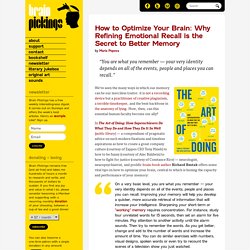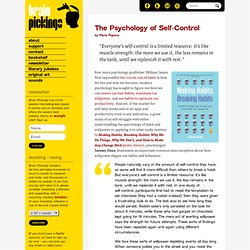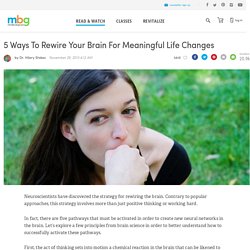

Productivity Strategies. How to Optimize Your Brain: Why Refining Emotional Recall is the Secret to Better Memory. By Maria Popova “You are what you remember — your very identity depends on all of the events, people and places you can recall.”

We’ve seen the many ways in which our memory can be our merciless traitor: it is not a recording device but a practitioner of creative plagiarism, a terrible timekeeper, and the bent backbone in the anatomy of lying. How, then, can this essential human faculty become our ally? In The Art of Doing: How Superachievers Do What They Do and How They Do It So Well (public library) — a compendium of pragmatic advice on such modern fixations and timeless aspirations as how to create a great company culture (courtesy of Zappos CEO Tony Hsieh) to how to be funny (courtesy of Alec Baldwin) to how to fight for justice (courtesy of Constance Rice) — neurologist, neuropsychiatrist, and prolific brain-book author Richard Restak offers some vital tips on how to optimize your brain, central to which is honing the capacity and performance of your memory: The Not-To-Do List: 15 Habits to Stop Now. How to Start Over: 3 Inspiring Real-Life Stories. By Mary Jaksch Here are three inspiring stories by Goodlife ZEN readers.

Each one of them had to start over and struggle through a new beginning. If you are contemplating a change to your life, read these stories. They will show you that it’s never too late to follow your passion and win out. Tess Marshall’s story My father had an 8th grade education and my mother attended school through 6th grade. I was born on an 88 acre produce and trucking farm. I never thought I was smart enough to attend college. I had dug myself a deep hole. Father Don, young and hip, helped coach the women’s softball team I joined. It was Father Don who convinced me to go to college. Because being a good parent was my priority, I never carried more than two or three classes at a time.
Raquel Galford’s story I had a defining moment in which my life shifted dramatically. However, I made a decision which would change this forever. Needless to say, money changes people. Kyrsten Bean’s story I was miserable. The Psychology of Self-Control. By Maria Popova “Everyone’s self-control is a limited resource; it’s like muscle strength: the more we use it, the less remains in the tank, until we replenish it with rest.”

Ever since psychology godfather William James first expounded the crucial role of habit in how we live and who we become, modern psychology has sought to figure out how we can rewire our bad habits, maximize our willpower, and use habits to optimize our productivity. And yet, if the market for self-help books and to-do apps and productivity tools is any indication, a great many of us still struggle with either understanding the psychology of habit and willpower or applying it to what really matters. In Making Habits, Breaking Habits: Why We Do Things, Why We Don’t, and How to Make Any Change Stick (public library), psychologist Jeremy Dean illuminates an important common misconception about how willpower shapes our habits and behaviors: Donating = Loving Brain Pickings has a free weekly newsletter.
Share on Tumblr. 5 Ways To Rewire Your Brain For Meaningful Life Changes. Neuroscientists have discovered the strategy for rewiring the brain.

Contrary to popular approaches, this strategy involves more than just positive thinking or working hard. In fact, there are five pathways that must be activated in order to create new neural networks in the brain. Let’s explore a few principles from brain science in order to better understand how to successfully activate these pathways. First, the act of thinking sets into motion a chemical reaction in the brain that can be likened to plugging in a string of lights. As you think about something—be it positive or stressful—you turn on a string of lights related to that topic. Second, the more you think, feel and act the same way, the faster the lights turn on and the brighter they glow.
Finally, we have trillions of brain cells, resulting in thousands (if not millions) of strings of lights correlating with our habits in all areas of our life. 1. Seeing is not required for believing. 2. 3. 4. Practices.